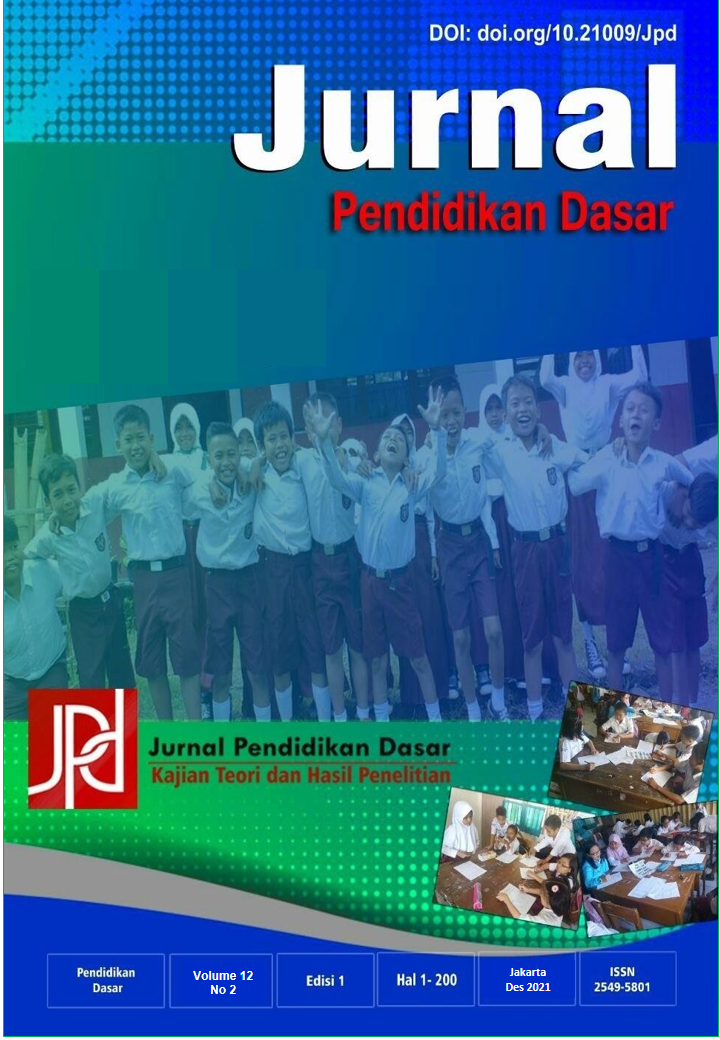PENGARUH MODEL PEMBELAJARAN INDUKTIF DAN SELF-CONFIDENCE TERHADAP KEMAMPUAN PEMAHAMAN KONSEP MATEMATIK SISWA KELAS V SEKOLAH DASAR
DOI:
https://doi.org/10.21009/jpd.v12i02.25806Keywords:
inductive approach, mathematical understanding, self-confidence.Abstract
The purpose of this study is to determine the differences in the ability to understand mathematical concepts of students who are taught by using inductive approaches and conventional learning and the differences in the ability to understand mathematical concepts of students who have high and low self-confidence. In addition, this study aims to determine the effect of the interaction between learning approaches and self-confidence on the ability to understand mathematical concepts. This research was carried out at SDN Pasauran 1, Cinangka District. The method used in this research is a quasi-experimental design with 2x2 level treatment. The data collection technique was a concept understanding test and a student self-confidence questionnaire. Testing the research hypothesis using two-way analysis of variance. Before testing the hypothesis, the data must meet the assumptions of normality and homogeneity, the test results show that the data is normally distributed and homogeneous. The results of the two-way analysis of variance test show that: there is a significant difference between students who are taught through inductive approach learning and conventional learning, there is a significant difference between students who have high and low self-confidence, there is an interaction effect between the learning approach and self-confidence on the ability to understand mathematical concepts and there are differences in the ability to understand mathematical concepts between students who are taught through inductive and conventional learning approaches, both for students who have high and low self-confidence.
References
Çiftçi, K. effect of self-confidence on mathematics achievement: T. meta-analysis of T. in I. M. and S. S. (TIMSS), & Yildiz, P. (2019). The effect of self-confidence on mathematics achievement: The meta-analysis of Trends in International Mathematics and Science Study (TIMSS). International Journal of Instruction, 12(2), 683–694. https://doi.org/10.29333/iji.2019.12243a
Cooke, H. (2007). Mathematics for primary and early years: Developing subject knowledge. In Mathematics for Primary and Early Years: Developing Subject Knowledge. https://doi.org/10.4135/9781446216040
Dell’Olio, J. M., & Donk, T. (2007). Models of teaching: Connecting student learning with standards. Models of Teaching: Connecting Student Learning with Standards, 1–484. https://doi.org/10.4135/9781452232324
Dini, M., Wijaya, T. T., & Sugandi, A. I. (2018). PENGARUH SELF CONFIDENCE TERHADAP KEMAMPUAN PEMAHAMAN MATEMATIK SISWA SMP. Jurnal Silogisme, 3(1), 1–7.
Hannula, M. S., Maijala, H., & Pehkonen, E. (2004). DEVELOPMENT OF UNDERSTANDING AND SELF- CONFIDENCE IN MATHEMATICS ; GRADES 5 – 8. 3, 17–24.
Joseph, I. (2017). You Got This Mastering the Skill of Self-Confidence by Ivan. Canada: calypso Grove Press.
Joyce, B., Weil, M., & Calhoun, E. (2015). Models of Teaching. (Ninth Edition). Yogyakarta: Pustaka Pelajar.
Lambertus. (2016). Developing skills understanding of mathematical. International Journal of Education and Research, 4(7), 315–326. https://www.ijern.com/journal/2016/July-2016/25.pdf
Mokmin, N. A. M., & Masood, M. (2015). The Development of Self-Expressive Learning Material for Algebra Learning: An Inductive Learning Strategy. Procedia - Social and Behavioral Sciences, 197(February), 1847–1852. https://doi.org/10.1016/j.sbspro.2015.07.245
Muliana, dkk. (2019). Using inductive approach (IA) to enhance students’ critical thinking (CT) skills. Journal of Physics: Conference Series, 1280(5). https://doi.org/10.1088/1742-6596/1280/5/052035
Nufus, H., Duskri, M., & Kuala, U. S. (2018). Mathematical Creative Thinking and Student Self-Confidence in the Challenge-Based Learning Approach. 3(2), 57–68.
OECD. (2019). PISA 2018 Results. Combined Executive Summaries. Journal of Chemical Information and Modeling, 53(9), 1689–1699. https://doi.org/10.1017/CBO9781107415324.004
Purwasih, R. (2015). 16 Jurnal Ilmiah STKIP Siliwangi Bandung. 9, 16–25.
Rudyanto, H. E. (2017). Inductive Thinking: Learning Mathematics Constructtivistic for Elementary School Students. PROCEEDINGS INTERNATIONAL SEMINAR OF PRIMARY EDUCATION, 1, 80–85.
Saleh, H., & Yumiati. (2019). NCTM’s Principles and Standards for Developing Conceptual Understanding in Mathematics. Journal of Research in Mathematics Trends and Technology, 1(2), 56–65. https://doi.org/10.32734/jormtt.v1i2.2836
Sari, S. M., Nindiasari, H., & Santosa, C. A. H. F. (2021). The Influence of Contextual Approach on the Mathematical Understanding and Communication Abilities as Seen from Students’ Initial Mathematical Abilities. Journal of Medives : Journal of Mathematics Education IKIP Veteran Semarang, 5(1), 151. https://doi.org/10.31331/medivesveteran.v5i1.1289
Sari, Y. (2018). Pengaruh Pendekatan Pembelajaran Induktif Terhadap Hasil Belajar Siswa Smp Negeri 1 Rantau Selatan Kabupaten Labuhan Batu. Maju, 5(2), 64–75.
Silver, H. F., Strong, R. W., & Perini, M. J. (2007). Strategic Teacher. USA: ASCD.
Stankov, L., Lee, J., Luo, W., & Hogan, D. J. (2012). Con fi dence : A better predictor of academic achievement than self-ef fi cacy , self-concept and anxiety ? Learning and Individual Differences, 22(6), 747–758. https://doi.org/10.1016/j.lindif.2012.05.013
Suhardita, K. (2011). EFEKTIVITAS PENGGUNAAN TEKNIK PERMAINAN DALAM BIMBINGAN KELOMPOK UNTUK MENINGKATKAN PERCAYA DIRI SISWA. Edisi Khusus, 1, 127–138.
Wardani, S., & Kusuma, I. . (2020). Comparison Of Learning In Inductive And Deductive Approach To Increase Student ’ S Conceptual Understanding Based On International Standard. Jurnal Pendidikan IPA Indonesia, 9(1), 70–78. https://doi.org/10.15294/jpii.v9i1.21155
Wardhani, S. (2008). Analisis SI dan SKL Mata Pelajaran Matematika SMP/MTS Untuk Optimalisasi Pencapaian Tujuan. Pusat Pengembangan dan Pemberdayaan Pendidik dan Tenaga Kependidikan Matematika, 9–10.
Warimun, E. S., & Murwaningsih, A. (2015). Model Pembelajaran Induktif untuk Meningkatkan Pemahaman Konsep dan Keterampilan Generik Fisika Siswa SMA. 1, 105–110.
Downloads
Published
How to Cite
Issue
Section
License
Jurnal Pendidikan Dasar





















